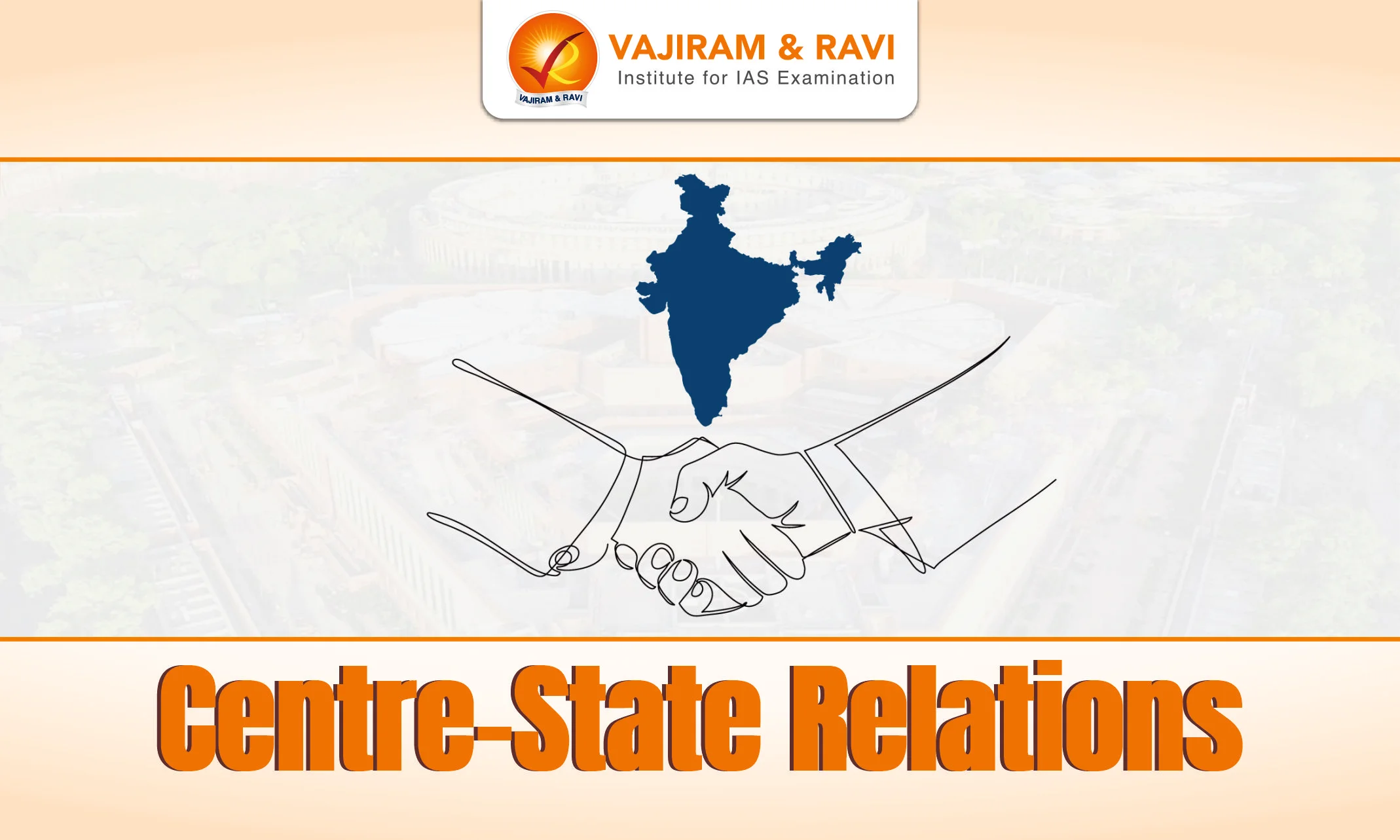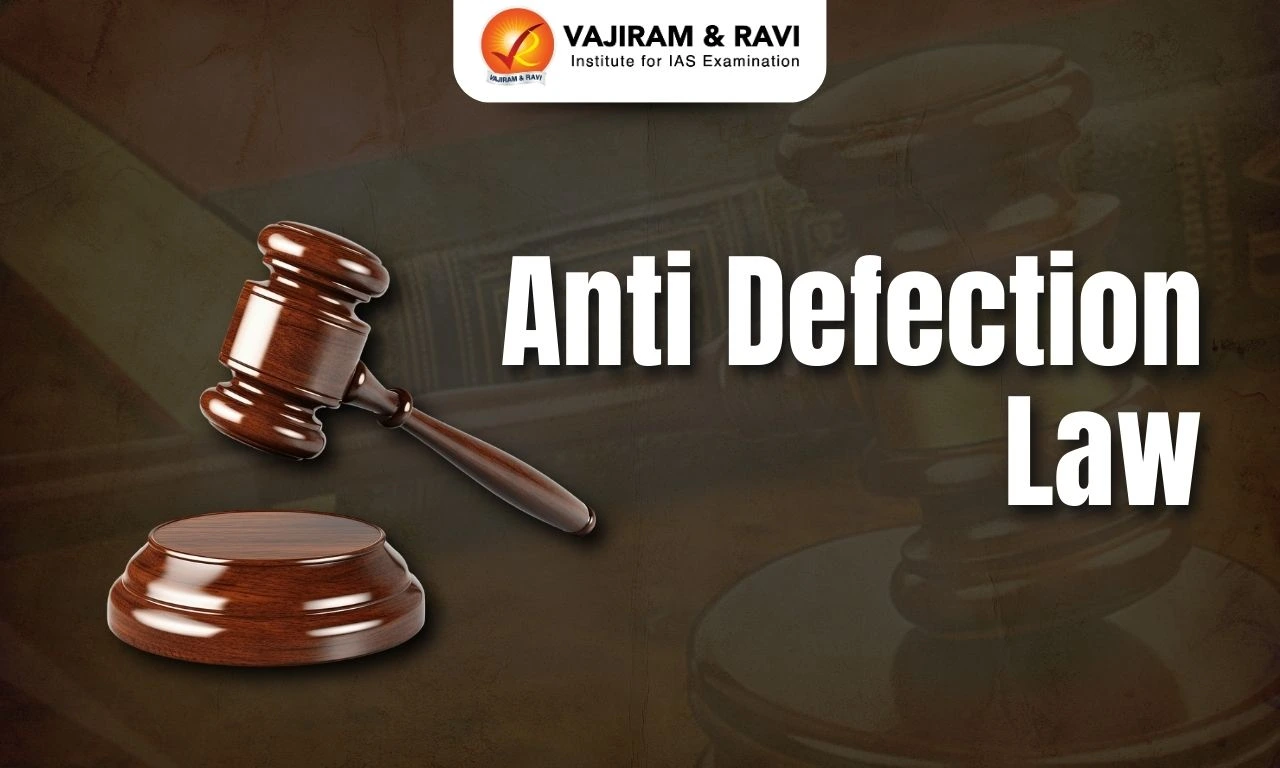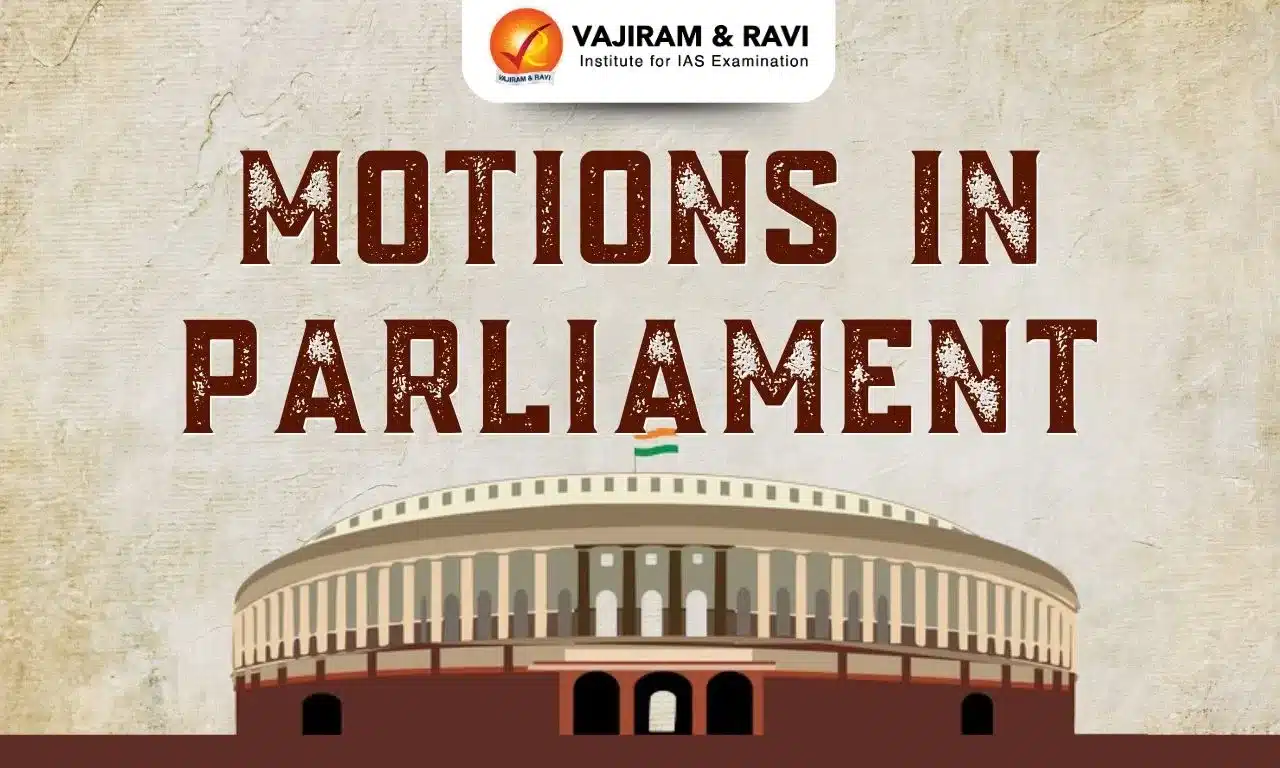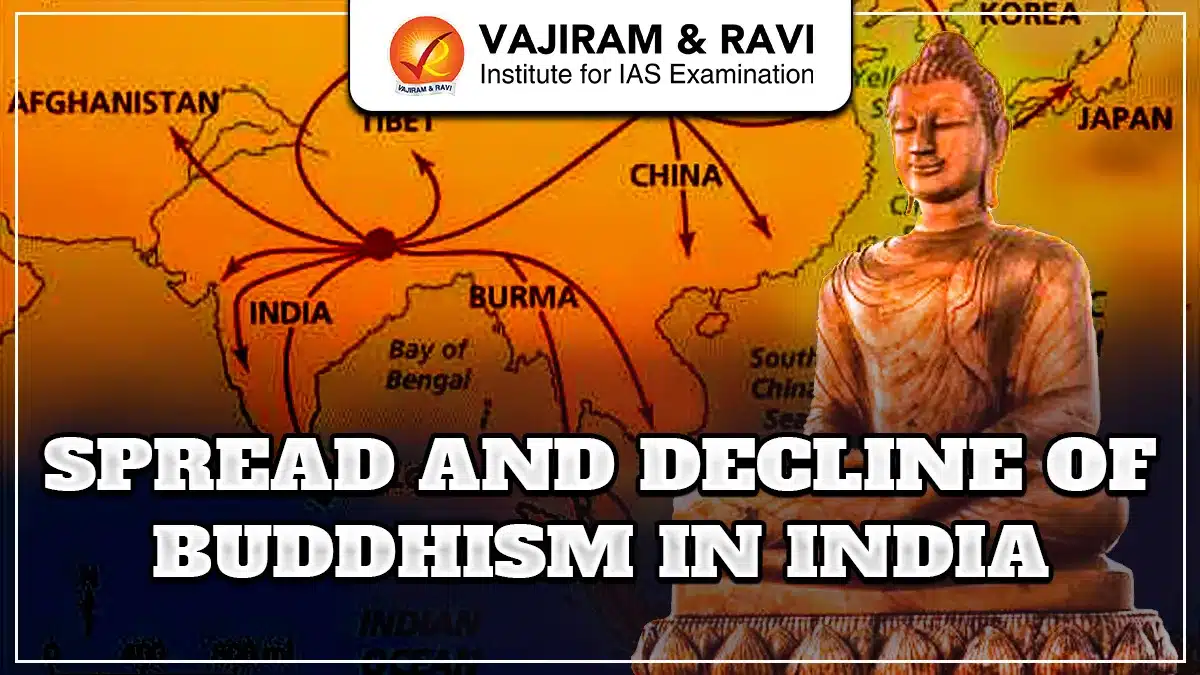How are the Powers and Functions Divided in the Indian Federal Setup?
In the Indian federal setup, the Constitution divides the legislative, executive, and financial functions between the Centre and the states. The Constitution established an integrated judicial system to uphold federal and state laws.
The Centre-state relations cut across the following three subject matters
- Legislative relations
- Administrative relations
- Financial relations
What are the Centre-State Relations on Legislative Matters?
Part XI of the Constitution deals with the legislative relations between the Centre and the states in Articles 245 to 255. Different aspects in the Centre-state relations are as follow:
| Territorial Extent of Central and State Legislation | |
| State legislature | Can enact laws that apply to the whole or any part of the state. |
| Parliament |
Authority to enact laws for whole or any part of the territory of India Extra-territorial legislation |
| Distribution of legislative subjects | |
| Union List | The Union Parliament has exclusive powers to make legislation on the matters included in the Union List. |
| State List | The State Legislatures have exclusive powers to make legislation on the matters incorporated in the State List. |
| Concurrent List | Both the Centre and states can make laws on the subjects included in the Concurrent list. |
| Article 248 | The Residuary powers are given to the Centre, and the Parliament of India alone can make legislation on the subjects not included in any of the above three lists. |
| Parliamentary Legislation in the State Field | |
| Article 249 | If the Rajya Sabha passes a resolution by a majority of two-thirds of its members requesting Parliament to make law on a subject of State List. |
| Article 250 | Parliament to make laws on any State List subjects during a national emergency. However, the Parliament’s laws under this provision will cease to operate on the expiration of six months of the emergency. |
| Article 252 | If two or more States’ legislatures request Union Parliament through a resolution to make a law on a particular subject mentioned in the State List. |
| Article 253 | Parliament to make law for the whole or any part of India’s territory for implementing any treaty, international agreement or convention with any other country. |
| Article 356 | During the proclamation of President’s Rule in a State, the Union Parliament makes the laws over the subjects included in the State List. |
| Centre’s Control Over State Legislation | |
| Article 200 | The Governor can reserve specific bills passed by the state legislature for the consideration of the President of India. |
What are the Centre-State Relations on Administrative Matters?
Articles 256 to 263, Part XI of the Constitution, deal with administrative relations between the Centre and the States.
| Distribution of Executive Powers | |
| Union Government | Executive power extends to all the subjects on which Parliament can make laws |
| State Government | Executive power shall be exercised in conformity with the laws made by the Union Parliament. |
| Centre’s directions to the States | |
| Article 256 | Every state’s executive power is to be exercised in such a manner as to ensure compliance with the laws made by the Union Parliament. |
| Article 257 | Control of the Union over States in certain cases. |
| Relation during emergencies | |
| National emergency | The Centre has the executive power to direct any state regarding the manner in which the executive power is to be exercised. |
| President’s rule | The Union Government can take direct control over State machinery. The President (that means the central government) takes over any of the State Government’s functions. |
| Public service commission | |
| State public service commission | The Governor appoints the state public service commission's chairman and members, but only the president has the authority to remove them. |
| All Indian Services | |
| Control of Centre and state control | The Centre has ultimate control over these services, whereas states exercise immediate and relatively less control. |
| Other Provisions | |
| Article 355 | It shall be the duty of the Union to protect every State against external aggression and internal disturbance. |
| Appointment of Governor | The Governor of a State shall be appointed by the President by warrant under his hand and seal. He holds office during the pleasure of the President. |
| Appointment of State Election Commissioner | The state election commissioner is appointed by the Governor but removed only by the President. |
What are the Centre-State Relations on Financial Matters?
Articles 268 to 293 contained in Part XII of the constitution deal with Centre-state financial relations.
| Allocation of Taxing Powers | |
| Parliament and State legislature | The Parliament and State legislature have exclusive power to levy taxes on subjects incorporated in the Union list and state list, respectively. |
| Residuary powers | The residuary power of taxation lies with Parliament only. |
| Grants-in-aid | |
| Article 275(1) | The Parliament can issue grant-in-aid of the revenues to such States as Parliament may determine, and different sums may be fixed for different States. |
| Article 282 | The Union or a State may make any grants for any public purpose. |
| Goods and Services Taxes | |
| The Constitution (One Hundred and First Amendment) Act 2016 | To change the tax structure and introduce GST. Such an amendment can empower the Centre and the States to levy and collect GST. |
| Finance Commission | |
| Article 280 | It provides for a Finance Commission as a quasi-judicial body. Its responsibility is to recommend the sharing of taxes between them. |
What are the Issues Pertaining to Centre-State Relations in India?
These are issues pertaining to Centre-state relations:
- Allocation of resources: There is often a dispute between the Centre and the states over the allocation of resources, including funds, taxes, and other benefits.
- With the introduction of the GST, revenue collection and sharing have been streamlined. Yet, there are concerns relating to the revenue-sharing criteria used by the Finance Commission.
- Challenging Centre law: Kerala has filed a suit in the Supreme Court of India seeking to declare the CAA as unconstitutional. Chhattisgarh has also filed a similar suit, challenging the constitutional validity of the National Investigation Agency Act.
- Misuse of article 356: It is said that Article 356 was nearly always employed for political purposes rather than a real breakdown of the constitutional machinery. Different cases have been seen in Arunachal Pradesh and then in Uttarakhand.
- Office of Governor: The initial point of tension is that the Centre appoints the Governor as if he/she is a representative of the Centre, and the Centre government has found in the office of the Governor an effective instrument to recapture power for itself.
What Measures Can Ensure Harmonious Centre-State Relations?
Sarkaria Commission, 1983
- The institution of All-India Services should be strengthened, and more such services should be created.
- The Union should occupy only that much field of a concurrent subject on which uniformity of policy is needed and leave the rest for state action.
MM Punchhi Commission, 2007
- The scope of devolution of powers to local bodies to act as institutions of self-government should be constitutionally defined through appropriate amendments.
- The Commission has recommended a fixed five-year tenure for Governors and their removal only through impeachment by the state Assembly along the same lines as that of the President by the Parliament.
National Commission to Review the Workings of the Constitution (NCRWC), 2000
- In accordance with Article 307, the Inter-State Trade and Commerce Commission should be established as a legislative body.
- Emergency and disaster management should be covered in the Concurrent List of the Seventh Schedule.
Other measures
- Centre-state institutions: Institutions such as the Inter-State Council, Finance Commission, and Niti Aayog need to be strengthened to ensure a smooth relationship between the Centre and states.
- Fiscal Federalism: Fiscal federalism ensures the distribution of resources between the Centre and states in a fair and transparent manner. The Centre and states should work towards promoting fiscal federalism to ensure equitable distribution of resources.
- Revisit the seventh schedule: Some scholars have advocated further decentralization of the Schedule by introducing a local government list.
- Innovations at the state level: States are important repositories of innovation and change. Hence, States should be encouraged to introduce such innovation.
- Power-sharing: The Centre and states have to work together to ensure that power is shared effectively and there is no concentration of power in one entity.
| Also Check | |
| Fiscal Federalism | Inter State Council |
| Punchhi Commission | Sarkaria Commission |
Last updated on February, 2026
→ UPSC Notification 2026 is now out on the official website at upsconline.nic.in.
→ UPSC IFoS Notification 2026 is now out on the official website at upsconline.nic.in.
→ UPSC Calendar 2026 has been released.
→ UPSC Final Result 2025 is expected to be released in the first week of March 2026.
→ Check out the latest UPSC Syllabus 2026 here.
→ Join Vajiram & Ravi’s Interview Guidance Programme for expert help to crack your final UPSC stage.
→ UPSC Mains Result 2025 is now out.
→ UPSC Prelims 2026 will be conducted on 24th May, 2026 & UPSC Mains 2026 will be conducted on 21st August 2026.
→ The UPSC Selection Process is of 3 stages-Prelims, Mains and Interview.
→ Prepare effectively with Vajiram & Ravi’s UPSC Prelims Test Series 2026 featuring full-length mock tests, detailed solutions, and performance analysis.
→ Enroll in Vajiram & Ravi’s UPSC Mains Test Series 2026 for structured answer writing practice, expert evaluation, and exam-oriented feedback.
→ Join Vajiram & Ravi’s Best UPSC Mentorship Program for personalized guidance, strategy planning, and one-to-one support from experienced mentors.
→ Check UPSC Marksheet 2024 Here.
→ UPSC Toppers List 2024 is released now. Shakti Dubey is UPSC AIR 1 2024 Topper.
→ Also check Best UPSC Coaching in India
Centre-State Relations FAQs
Q1. How are disputes between the Centre and the States resolved in India?+
Q2. What are the various committees on Centre-state relations in India? +
Tags: centre-state relations quest
















